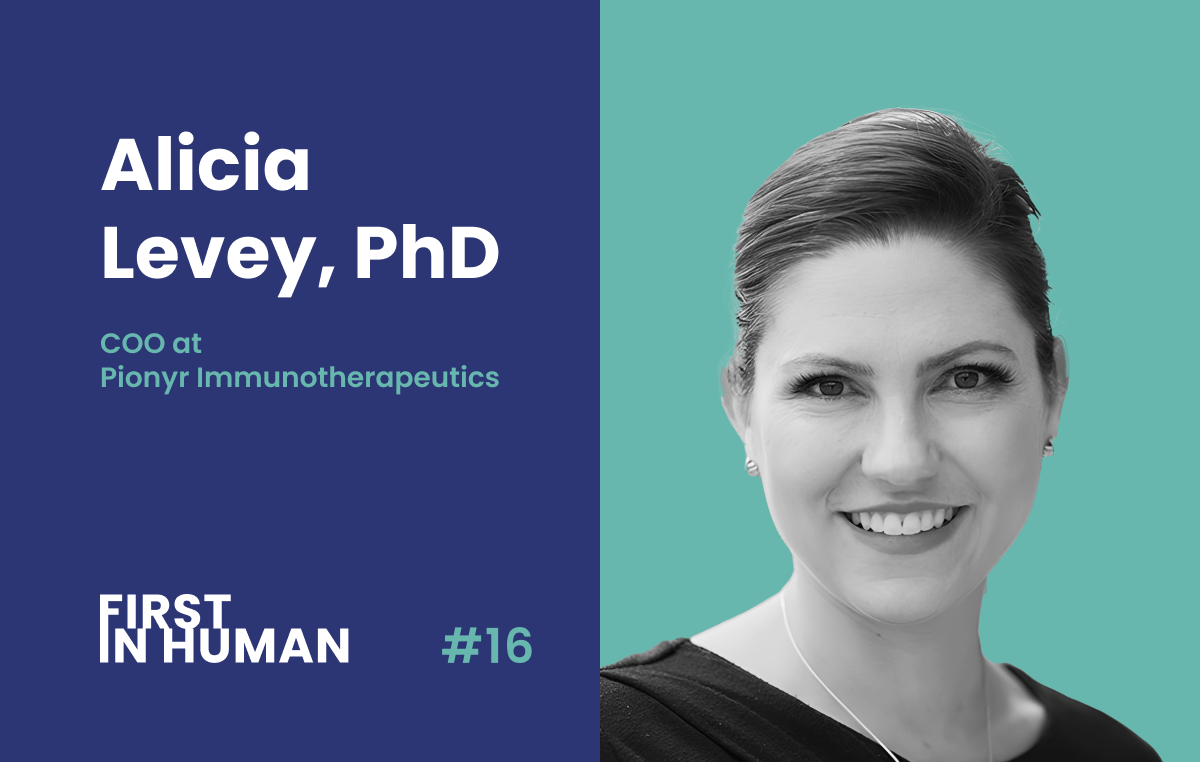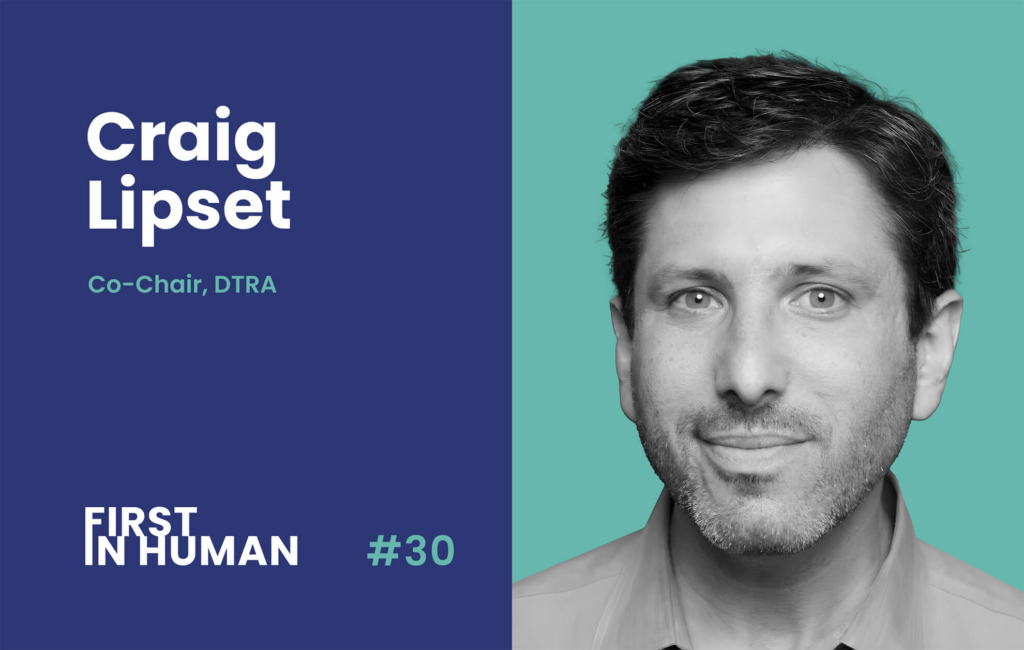For episode 16, we speak to Alicia Levey, COO at Pionyr Immunotherapeutics. Find out a common mistake among small biotech and why you should invest in the relationships with people on the other side of the table as much as you’re making sure your program is well positioned. First In Human is a biotech-focused podcast that interviews industry leaders and investors to learn about their journey to in-human clinical trials. Presented by Vial, a tech-enabled CRO, hosted by Simon Burns, CEO & Co-Founder & guest host Co-Founder, Andrew Brackin. Episodes launch weekly on Tuesdays & Thursdays.
Simon Burns: Thank you so much for joining us today on First in Human.
Dr. Alicia Levey: It’s great to be here, Simon.
Simon Burns: To kick it off, we’d love to hear a quick introduction into your background, how you got into this space and what led you to Pionyr
Dr. Alicia Levey: I’m a scientist by training. I did my PhD at, at Stanford in cancer biology. I realized quickly that I didn’t want to do academic science [laughs]. I made a transition to BCG did an on the job MBA. From there, went to Versant Ventures. I was on the investment team there for almost nine years, actually. Starting from investing and moving into company operations. I worked at several companies leading business development. I left to go to Pionyr three and a half years ago. I fell in love with the science and the team. I’ve been there ever since.
Simon Burns: Let’s talk about the science. Myeloid Tuning, very buzzy, very interesting. What compelled you about the science?
Dr. Alicia Levey: Myeloid Tuning is the brainchild of Max Krummel, our scientific founder. He’s a UCSF professor. He did a lot of the work in Jim Allison’s lab [nobel laureate], to identify CTLA-4, which was one of the first immuno-oncology targets.
The first set of immuno-oncology targets were mostly targeting the T-cell. So, One arm of the immune system. Max realized that we had this whole other arm of the immune system, the myeloid compartment, that we’re not leveraging. We’re not targeting it. If we want to fully harness the potential of the immune system we can’t just rely on one arm of the immune system. We need to leverage both.
He started his lab to identify targets that are exquisitely expressed in the tumor-immune microenvironment on the surface of myeloid cells. That was the birth of Pionyr. The first two programs, TREM1 and TREM2 programs, were identified by some of that early work. We moved those programs into the clinic. They’re currently in Phase 1B of the expansion studies. Now, we have the whole other slate of other programs that we’re developing behind that. Our third program, MARCO, is, a novel program that we are hoping to put into the clinic this year.
Simon Burns: Y265, right?
Dr. Alicia Levey: That’s right. [laughs]
Simon Burns: Uh, Tell us more about 2023 for Pionyr. Several programs at the clinic have lots more behind it. What gets you excited? What are you looking forward to?
Dr. Alicia Levey: We’re hoping that our, Gilead [00:05:00] collaboration continues to move long well you know, ideally comes to fruition. With our MARCO program, we’re thrilled to be advancing a third Myeloid team program into the clinic. That program is unique and differentiated from the first two programs. MARCO is what’s called a scavenger receptor. It’s a receptor that sits on the surface Myeloid cells. Mostly microphages.
Its normal function is to scan the environment for pathogens and help clear out those pathogens. bur for reasons that aren’t understood, we have found, and others have found, it’s quite well-published at this point, that there are very high-levels of MARCO expression in the tumor immune micro environment and multiple different tumor types. That expression increases as the stage of the cancer increases.
We reasoned that if we develop an antibody that targets MARCO, that we could potentially stimulate the immune system by targeting that receptor. That would lead to downstream immune activation, of hijacking its normal function for clearing pathogens but use it to help clear tumor cells. Y265 is a first in class, myoclonul antibody targeting MARCO. It functions as immnomodulatory re-programmer, mostly of tumor-associated macrophages. We’ve studied it in mice. We’ve shown that it’s safe in non-human primates. Now it’s off to the races, leaving it to the clinic.
Simon Burns: Let’s talk about BDs, about partnerships. The important stuff that is leading all things doing deals biotech companies. I’m curious what you see small biotech companies do to correct the mistakes they make. What do you think has been key to success in your, deal-making?
Dr. Alicia Levey: This is a big question. [laughs] But, I think one common mistake I see is that people aren’t focusing on the underlying human relationships that are needed to get a deal done. obviously people focus on you know, who are the pharmas that we should be speaking to? How might our drugs combine with our pipeline?
Obviously, your job is to get the best deal, possible. I think sometimes people forget that to get any deal done, you have to have trust and to get the best terms possible. Especially, if you’re trying to do a collaboration. You need to build that trust as you’re doing the deal. So, you should invest in the relationships with the people on the other side of the table, as much as, you’re investing in making sure your pitch doc is perfect, and making sure your program is, well-positioned.
I always seen that as my job you know, as a head of business development is to make sure that I am, at every step along the way, making sure that I’m building a relationship and building trust. That is, good for the company. At the need of the day it helps you maximize value on both sides. but it’s good, for your career as well, because you can continue to leverage those relationships at your next company, or maybe on your next deal.
Simon Burns: Let’s talk about the IO field. Let’s talk about immuno-oncology. Incredibly productive last, five years We talked about Jim Allison. We now have seen the fruits of the early stage academic labor come to . Bear. What are the next five years come to bear for immuno-oncology?
Dr. Alicia Levey: If I could predict that I I wouldn’t have to have a day job anymore. But, [laughs] I do have a couple of thoughts. Some of them are, of course, biased based off what we’re working on. I do think that one of the next breakthroughs in immuno-oncology will be leveraging this whole other arm of the immune system, the myeloid space.
I, I fundamentally believe that we’ll have to do more than just targeting T cells and NK cells to increase the number of patients that have meaningful responses to IO therapies. Right now, 30% of patients have a response or their tumor’s even, treatable with an IO therapy. The percentage of patients that respond is even smaller. At the end of the day, we’re only helping you know, maybe 10 to 12% of all cancer patients with these therapies.
While this is the next big thing in cancer treatment. We’re still only tackling this very small percentage. And, That’s why expanding the immune cell types that we’re bringing to bear are going to be important. I think that next generation CAR therapies are obviously going to play a role, whether it’s next generation CAR-T therapies, or the upcoming CAR-NK, or CAR-Ms. I also think there’s going to be a role for multifunctional antibodies containing unique payloads including immunomodulators. Those are going to be some of the the interesting things to watch.
Simon Burns: You’ve gone through a few different interesting career transitions. Obviously getting an MBA coming from academic medicine. How did you think about those and what advice do you have for younger folks in the career? Thinking about each of those transition from going business school, taking a bio tech path, et cetera?
Dr. Alicia Levey: I did a PhD and then I didn’t go to business school. I did kind of a on-the-job MBA for almost thee years. I think one of the hardest things to do, and act upon is recognizing when it might be time to move on from something. Speaking of how both of us are podcast geeks, I listen to Stephen Dubner’s People I Mostly Admire, podcast. He talks a lot about quitting and how people don’t quit enough. He’s [00:10:00] absolutely right. It’s hard for those of us who want to always be achieving and especially those of us who are super-loyal.
It’s hard for us to think about when is it the right time for me to say, “Hey, I’m not learning any more, or maybe this isn’t the best situation me to continue to grow and deliver to this company. Maybe it’s time to move on and grow into a new role.” That’s the thing that I found to be the hardest but also the most important thing in when thinking about, career growth.
Simon Burns: Last question for you. At Vial, we think a lot about clinical trial infrastructure, a lot about CROs. We think a lot about the applicatios of technology it could make trials efficient. Where do you see room for technology to help drive clinical trial efficiency and maybe just give us a backdrop about some of the, the past experiences you got running trials and key lessons there.
Dr. Alicia Levey: As you and I have discussed previously, you know, this is an area that’s so clearly ripe for destruction, right? Um, you know, One of the you know, make or breaks for a company of our size is how fast can we get a trial running? How fast can we enroll? Every month we’re looking at our burn rate, right? Um, Speed is clearly critical. Um, Getting sites open. Um, you know, uh, Getting those patients identified um, ,getting them enrolled. Um, so, you know, I think that’s one of the, the areas that um, you know, I see as, as most ripe for destruction. In Um, the most need of technology solutions uh, because clearly what we’ve been doing in the past isn’t, isn’t, you know, meeting the needs of, of, the especially small companies today.
Simon Burns: Well With that, thank you so much for joining us and for winning the award for best recording backdrop. Which is highly sought after.
Dr. Alicia Levey: [laughs] Yes. [laughs]
Simon Burns: Thank you for sharing the time.
Dr. Alicia Levey: Yeah, yeah. Thank you.



